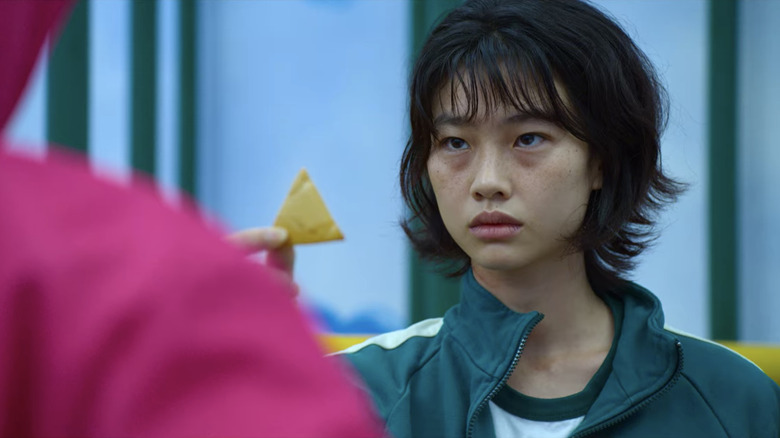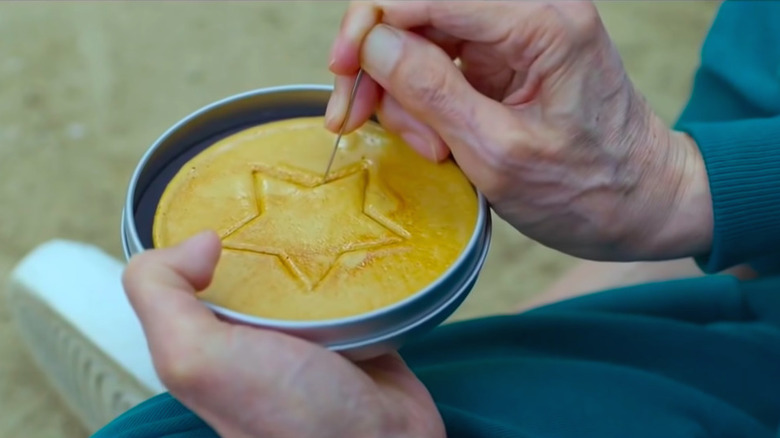Squid Game Star Jung Ho-Yeon Failed One Of The 'Games' In Real Life
Spoilers through episode 3 of "Squid Game."
It might sound odd, but part of what makes Netflix's new global sensation, "Squid Game," so utterly horrific is all the nostalgia. The "Battle Royale"-esque storyline sees hundreds of contestants competing in various games for an enormous sum of money. Except, rather than fight to the death, they're playing a bunch of drastically scaled-up children's games. You might recall fond childhood memories of playing "red light, green light" in the park or schoolyard games of tug of war.
Well, if you've already binged the show — and the numbers say you probably have — then those memories are now poisoned. All that remains is this bloodbath of a series and the emotional trauma it's sure to cause.
Among the nostalgic games was one that was notably unfamiliar to western audiences: the dalgona candy carving game presented as a "honeycomb challenge." Contestants were tasked with carving a shape out of a brittle candy sheet called dalgona — any damage to the engraved shape, be it the tiniest crack, would cost them their lives. And according to "Squid Game" actress Jung Ho-yeon, it's harder than it looks.
Jung Ho-yeon is one of the series biggest breakout stars, playing fan-favorite badass Kang Sae-byeok, who plans to use the prize money to bring her family back together. In a recent TikTok Q&A for TIME, Jung was asked which "Squid Game" challenge she thinks she would fail and revealed that she's already been tested on the dalgona challenge ... and it didn't go well.
"Actually, Netflix Korea [...] made me do [the dalgona challenge], but I failed. Two times. They gave me two opportunities but I failed all the time"
We can probably all agree that the "Squid Game" challenges would go pretty poorly for your average person (especially given how quickly the contestant numbers start to dwindle). But the cutesy-looking honeycomb challenge is almost enough to lull us into safety. Unlike the obvious and immediate chaos of, say, a "red light, green light" game with a monstrous, all-seeing doll, the dalgona challenge almost seems doable. Just carefully carve a shape out of candy. Simple, right? Evidently not. For Jung Ho-yeon, it was challenging even without the added stress of her life being on the line. And for the characters of "Squid Game," it probably didn't help that gunshots were ringing out all around them.
How Squid Game's Subtitles Alter Dalgona
In part because of "Squid Game," dalgona is stirring up a lot of interest across the web. A cursory Google search will bring up dozens of recipes with intros citing the show's popularity and walking readers through the best strategies for carefully carving out the shapes. But its appearance in the show is also leading to crucial discussions surrounding the series' translations.
"Squid Game" is inspiring a lot of chatter around subtitles, and how they alter the meaning of the series: dalgona being a key example. The game played in the episode is actually called "seoltang bbopki," or "sugar picking" which the show's localized subtitles translate to "sugar honeycombs." While this isn't an inaccurate translation, and it certainly accomplishes the goal of clarifying for non-Korean speaking audiences, the decision speaks volumes about subtitle priorities. Not calling the game by its Korean name erases its cultural specificity, compromising an opportunity to delve into Korean culture for the sake of making English-speaking audiences more "comfortable." This also means losing the power of bbopki's nostalgia, a key part of what makes the series and its games so effective. Many are criticizing this decision and the many others that prove how such changes can alter the writers' original intent, and thus change the show itself.
This is a mistake that can be learned from, and one that even helped the show's overwhelming popularity. Streaming services like Netflix have been vital when it comes to getting non-English shows and movies before a wider global market. But if the final product is altered by its translations, then the benefits of that accessibility suffer. With the explosion of "Squid Game," and an uptick in this debate, hopefully, the issue can be addressed.

